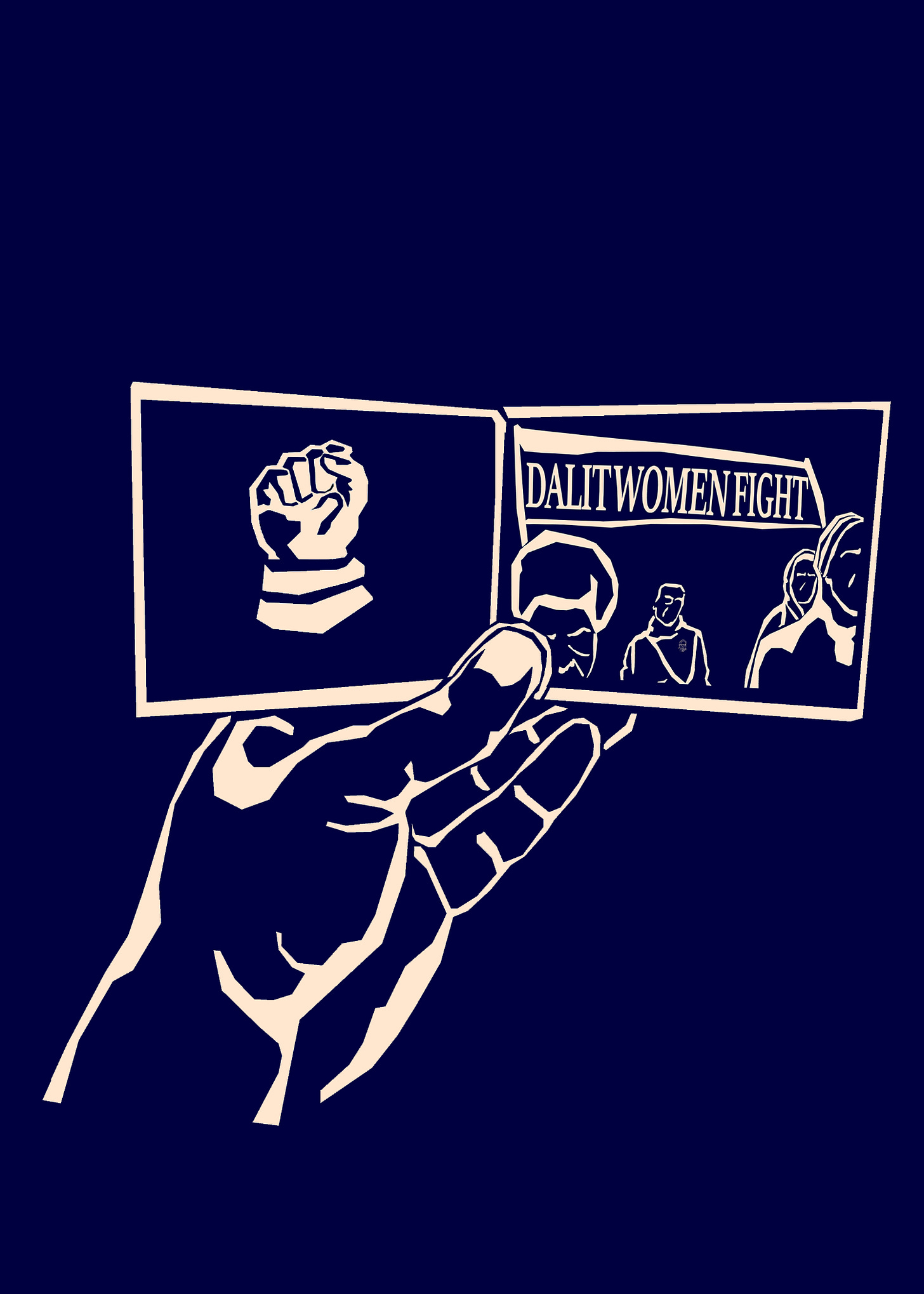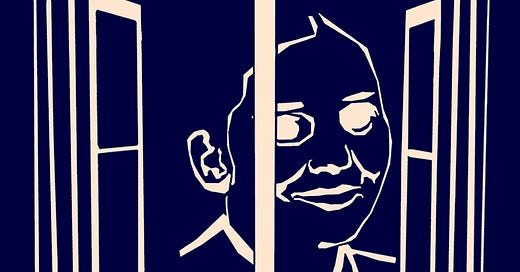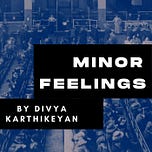
Edited by Febin Mathew
Art by Rahee Punyashloka (@artedkar on instagram)
Listen to the Minor Feelings podcast on Spotify.
It’s been an exhausting two weeks. Nothing short of it. We’ve been wrung dry by news channels and politicians baying for blood. Someone’s blood, any blood. Our seething rage has thrown us into an almost dysfunctional tizzy, and yearning to be the bigger person among those who want to stay ignorant at this moment has never come at a more significant cost. Welcome. Welcome to our new world, and welcome to waking up tired everyday.
I’m talking about India, my home country, crashing and burning from apathy and the stark inequities in responding to the rape and death of a young 19-year-old Dalit woman in Hathras, Uttar Pradesh.
She went into the fields in her village to collect cattle fodder, when she was raped by four upper caste men. Her spinal cord was severely injured and her tongue was allegedly cut off while she tried to fight off the men attempting to strangulate her. Humiliated by the police when she tried to report her rape, the case was registered only 6 days later. She died on September 20th, after a long struggle compounded by callous treatment from a hospital in New Delhi, her body was burned by the police overnight without her family’s knowledge. No last rites or respects could be paid, and her mother’s wish that she come home one last time, alive or dead, went woefully ignored.
Manisha. I wish we could have known her. Known more than that name or that incident, and not let her be defined by how our country and its institutions mistreated her. What did she like to do in times when she felt free and unbound by the rigours of home and work? What were her unbridled fantasies of what her life should be, years from now? Did she ever look up at the stars and hope that she could be whisked away from being a 19-year-old in this unequal, monumentally screwed-up reality? Did she, like so many other young women, want to be told that when she grew older, that she could go farther than the fields?
I'm raging. You should be too. We all should be. Let's never put aside this rage, or diminish it with grace. Let's be graceless and shameless. Let's channel our rage that's too much or too intense. But how?
Read. Donate. Educate. Organise. Most importantly, don't leave the burden on Dalit, Bahujan, and Adivasi folx to inform you. Here are some ways you can.
Turn off your television, take your social media break, and read this.
Donate here.
Then read this.
Donate here.
Then keep reading.
Read more.

For this week’s podcast, I talked to Christina Dhanaraj, a writer and advisor for Smashboard, a non-profit based in Paris and New Delhi. She was formerly a consultant for #dalitwomenfight and co-founder of Dalit History Month. In this episode, we discuss what it means to “pass the mic”, the inherent problems with the term, why it’s important to be anti-caste and how to be a good ally. You can also find it on Spotify.
I'm a privileged UC woman who has no business talking anymore. So here’s three powerful women Dalit activists and lawyers talking about exactly what it means to get tired. To get exhausted on panels and discussions and interviews and requests to write, as told to me. To educate UC folk on what it means to be systemically set up to fail in this godforsaken system. Over and over and over again. No paraphrasing.
KIRUBA MUNUSAMY, Lawyer at the Supreme Court of India.
When violence is obvious, I don’t see the need to constantly educate. It is for UC groups to analyse why the police didn't do what they need to. Justice is about the dignity you would expect. I have been expecting Brahmin UC feminists who do support us and do amplify us, and if media houses want the perspective of a Dalit woman, it’s totally fine. But most UC feminists are not like a lot of liberals who are young and want to talk about caste.Why isn’t anyone talking about this already unequal structure that is providing impunity? I see debates around “why look at caste? But what is the difference between us UC and Dalit women?” Access to justice.
I have survivor’s guilt. I do feel more safe while she couldn’t. And sometimes I wish I never existed. All I’ve taken up in my career is atrocity cases, but they (UC communities) cannot keep asking me to prove my existence over and over again. It pains me when I realise my 11 years of experience of being a lawyer is not enough to get justice in this country. I’m questioning myself over and over again.
But, I had a UC friend check on me to see if I’m okay, and he spoke to me for hours together, I talked about how broken and shattered I am. I feel like I’m not enough. Whenever I see a Dalit woman die of sexual violence, a part of me dies. Ambedkar was tired too. He didn’t want to be in the ministry or be with the Congress, while I navigated spaces and I have made it to a good position. I’m prepared to suffer.
SRISHTY RANJAN, Dalit rights activist
When I saw India Today’s Tanushree Pandey’s report that she was burnt, I was not able to sleep, I wasn’t able to talk to my family, only to my Dalit women friends. That’s where I found my solidarity. I was approached to write a piece but it was so emotionally taxing to write about it that I couldn’t finish it. Every time this is reported, all Dalit woman are made to realise their traumas in their past. We know we are more oppressed in this country. Sure, there are rapists who murdered her, but there are progressive people who are not able to see this as a caste crime.
The emotional labour people we’re putting in to focus on the premise of this incident as DBA folx was exhausting. Lots of journalists started putting out caste dynamics in Hathras stories. But why do we need this burden of proof on us?
Intense rage is the only feeling I have. I feel like crying because I’m emotionally vulnerable at this moment. Every day there is a development. The media is running on propaganda, but I didn't know they would dishonour the facts of this case.
I’m just a student right now. I give two interviews everyday and so the spotlight is suddenly on us, but it should have started very early. But when this fades out, we will be forgotten, all the spaces have opened up for Dalit women NOW.
One of the publications I’m writing for, I was asked to write my traumas in detail. I explained that I’ve not been functional, so I can’t, They asked me for details on my trauma, but why do we have to talk about our deepest traumas and recount it for them to listen to us?

CHRISTINA DHANRAJ, Writer and Advisor at Smashboard
There has indeed been a burden and you do feel like the onus is resting on your shoulders to prove that caste exists. I must confess though that even as a Dalit woman, who has accrued privilege over the last few years, I was not as aware of these atrocities as much as I am now. I do believe there should be some kind of exposure for us; we all need to take a journey to get to an informed place.
I went through that journey, maybe 7 years ago when I met Thenmozhi Soundararajan and Asha Kowtal (we were all part of Dalit Women Fight), and I got to know about the work grassroots activists were doing with Dalit women survivors of sexual violence. I was able to familiarise myself with the magnitude and the nature of these atrocities that were happening to marginalised women on an everyday basis.
There are many instances where people are like, “How are Dalit women affected by caste,” and invariably that question would demand that you give them an answer, and they would say, “but did you know many people are being killed and many women are being sexually assaulted too?”
In order to prove that caste operates against Dalit women, people quote data and statistics, or some kind of evidence pertaining to how Dalit women are being affected. And this conversation repeats itself over and over again, every time an upper or dominant caste person has this question on their mind. The outrage over Hathras has me feeling a familiar sense of hopelessness and fatigue. Well-known journalists, who have access to all the information, much more than we do, ask, “how does caste play a role in rape?”. And the Dalit woman is expected to provide an answer to that. How very tiring.
So how can we help out as allies and not screw up by standing for the very bureaucracy that is causing our downfall with our blissful ignorance and privilege?
#1 Solidarity.
Being a good ally is a lot like being a true friend. True friends do what their friends need the most at this moment. Support communities with being emotionally present and while you cannot truly empathise with them, listen mindfully and internalise their concerns. This is a difficult time, so show up.
#2 Read.
There are some links on here that are important pieces to read, but don’t stop with that. Your education on caste will never truly end. But the onus is on you and not Dalit communities or your DBA friend to educate you, especially in a world where information is so freely available. And pass it on, by sharing and educating more UC folk.
#3 Do not gaslight.
“This anger is not constructive,” “But this is the reality, no point being angry,” “Discrimination happens all the time.” Nope.
Gaslighting or questioning the centuries’ worth of rage that Dalit communities have is the last thing you should be doing right now when they open up to you about their lived experiences or educate you. Honour rage, honour their anger. Do not get confrontational or play devil’s advocate. It is not your place.
#4 Mind your language.
Casteist slurs have become a part of our language. It’s time to undo that. Some of these slurs can also include indicators of caste pride. (“Tambrahm” being a notable example of something “cheeky and fun”) Here is Divya Kandukuri’s thread on what terms have an insidious meaning.

#5 Face your discomfort. Head on.
Confront your inherent biases. This is not the time for fragility. If you feel personally attacked by something a person from the DBA community voices, listen and spend time in self-inquiry. Why do you feel attacked? If you’re called out on your casteist behaviour, acknowledge it and do better. Do not get defensive.
#6 Call it out when you see it.
Right now, we’re in our living rooms and dining tables as families, as friends. We’re bound to encounter people close to us who throw around slurs, gaslight, invalidate experiences, and have a cognitive dissonance around caste in terms of how they perpetuate it in their daily lives while performing progressiveness or wokeness. Don’t be afraid to call it out. If the person gets confrontational or aggressive, try to explain calmly. Send them resources, and keep the conversation going. It doesn’t end with just one discussion over dinner.
But let’s be honest, this is just a start and the buck doesn't stop here. Your best bet right now? Listen, read, and talk to the people around you about the realities of caste. Thanks for reading and listening, see you next time.








Share this post